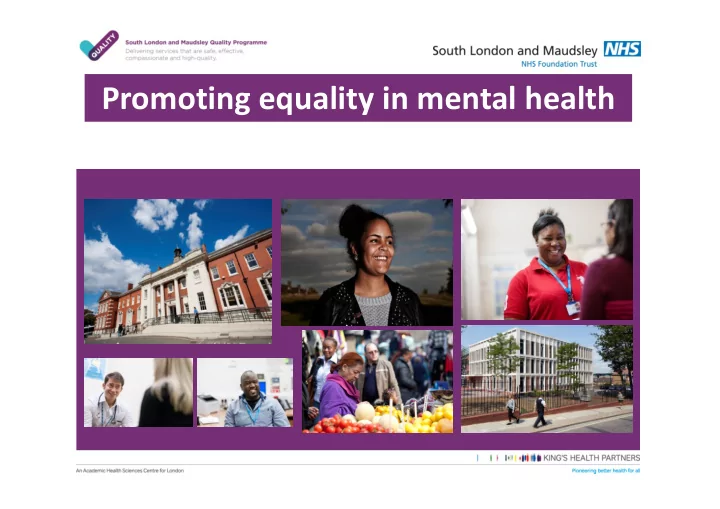

Promoting equality in mental health
Context High ethnicity diversity in Southwark 1) Largest proportion of Black African residents in the country 2) Large Latin American community with language needs and limited knowledge of NHS Longstanding societal race mental health inequalities 1) Higher risks of developing mental health problems for BME (especially Black) people 2) Mistrust of ‘the system’ among BME communities reinforced by high profile incidents and distressing local stories about bad experiences and outcomes 3) Lack of proper channels of engagement and communication between people from BME communities and the mental health system reinforces mistrust SLaM intends delivering equitable access, experience and outcomes for BME people and to improve trust and confidence by being accountable to local communities and stakeholders on race equality ���� www.slam.nhs.uk
Race equality in service delivery at SLaM Data to help improve access, experience and outcomes We collect, use and publish: 1) Local ethnicity reports published on the SLaM website since 2015. 2) Data on ethnicity profile of 12 key teams; PEDIC [our service user experience surveying system] experience broken down by ethnicity of Southwark respondents & IAPT recovery rates for BME people in Southwark. 3) Internal engagement with staff to produce and respond to the data. 4) External engagement with stakeholders to share knowledge and improve understanding and accountability. ���� www.slam.nhs.uk
Headlines from 2017 Southwark report - ACCESS 1) No big change in ethnicity profiles of caseloads and better ethnicity recording by all except IPTT - which has as a consequence put actions in place to address 2) Potential access issues in CAMHS and IAPT and work underway to address this e.g. ����������������������������������������������������������������������������������������������� �����!���������������"�����������������������������#�$����!�������%��� ����������������������� ������������&��'��������%(����������)"��# 3) Higher proportion of Black service users at all stages of the Psychosis pathway is comparable with higher risks of developing serious mental illness 4) Interpreters routinely used by all services to provide accessible communications. 5) The top three languages used in Southwark are Spanish, Arabic & Portuguese *��� www.slam.nhs.uk
Headlines from 2017 Southwark report - EXPERIENCE 1) Most respondents of all ethnicities report positive experiences of care 2) Experiences by ethnicity vary but no specific ethnicity consistently reported poorer than average over the last three years. 3) The chart below showing whether service users thought staff were kind and caring is indicative of this +��� www.slam.nhs.uk
Headlines from 2017 Southwark report - OUTCOMES 1) Slightly lower recovery rate for BME groups in Southwark IAPT (and other boroughs) 2) Evidence to suggest that this may be due to BME people coming to IAPT later and more unwell. 3) Work underway to improve access and experience at IAPT ,��� www.slam.nhs.uk
Workforce Race Equality at SLaM The Board set the Trust the challenge by Spring 2021 to: 1) Achieve representation of BME staff at pay bands 8C and above that reflects the proportion of BME staff in our workforce. 2) Eliminate the over-representation of BME staff involved in disciplinary proceedings. 3) Improve the Career Opportunities offered for BME staff. The Trust’s WRES implementation plan focused on achieving this challenge – approved by the Board in September 2017 and underway )��� www.slam.nhs.uk
Race Equality plans for 2018 A data-led approach to understanding and responding to race equality issues e.g. Improving consideration and action using ethnicity data on restraint, rapid tranquilisation and seclusion and the Trust’s use of the Mental Health Act. Strengthening partnership working with BME communities in Southwark 1) Borough and service alignment in Southwark 2) Healthwatch helping set up a Southwark BME Independent Advisory Group (IAG) to work in Partnership with Trust staff in joint group on the IAG’s areas of concern 3) Establishment of Trust-wide Independent Advisory Group/South London and Maudsley Partnership Group – IAG Chairs +1 from all 4 Boroughs to working in Partneship with Trust staff to share the learning -��� www.slam.nhs.uk
What about other inequalities? The Trust has also identified the need to prioritise improvements for: 1) Disabled service users: through compliance with NHS Accessible Information Standard 2) Lesbian, gay, bisexual and transgender service users: through implementing the NHS sexual orientation standard There is on-going engagement and consultation to develop final Trust-wide objectives prior to approval in April 2018. .��� www.slam.nhs.uk
Cross-system action on mental health inequalities How can the whole system help? Some issues for system-wide action include: 1) A shift from treatment to the prevention of mental health problems – education sector and employers have key roles 2) Targeting improvements for young people in communities at greatest risk of developing mental health problems (e.g. BME, LGBT communities) 3) Empowering diverse communities to tackle stigma and build resilience 4) Integrated action on the wider determinants of mental health (e.g. housing, employment, education, leisure, criminal justice) 5) Mental health investment standard (Parity of esteem) 6) Integrated action on physical and mental health ����� www.slam.nhs.uk
Recommend
More recommend